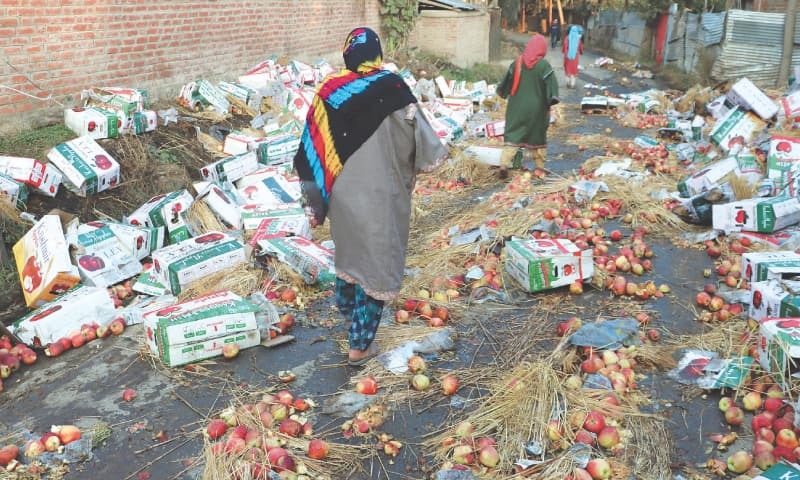Climate change and New Delhi’s actions devastate apple production in Kashmir
 Srinagar: Climate change has significantly impacted agriculture in Indian illegally occupied Jammu and Kashmir, with apple production now mirroring the decline previously seen in saffron cultivation.
Srinagar: Climate change has significantly impacted agriculture in Indian illegally occupied Jammu and Kashmir, with apple production now mirroring the decline previously seen in saffron cultivation.
According to Kashmir Media Service, the renowned Kashmiri apple yield has dropped by at least 30% for the second consecutive year.
In addition to climate challenges, Kashmiri apple orchards are facing severe destruction due to Indian government projects, particularly in Shopian, once known as the “Fruit Bowl of Kashmir.” The expansion of railway infrastructure has resulted in widespread devastation of these orchards. Critics argue that the Indian government could have rerouted the railway line to avoid orchards but chose to lay it through them intentionally, aiming to undermine the economic foundation of Kashmir, as apple production is vital to the region’s economy.
Farmers have reported that adverse weather conditions during critical fruit-setting periods have severely reduced yields. Unusually high temperatures in March were followed by a cool and wet April, then a prolonged dry spell, all detrimental to apple production. These fluctuations disrupted essential spray schedules, resulting in outbreaks of scab and other diseases, further compounding the drop in harvest.
Irshad Ahmad, a grower from Islamabad district, noted that some areas have seen production fall to just 70% of last year’s yield. Jahangir Ahmad Dar from Watchi, Shopian, reported a drastic decline, stating his harvest shrank from about 1,200 apple boxes last year to only 300 this year. Many marginal farmers are struggling to afford the rising costs of pesticides and fertilizers needed to combat these emerging diseases.
After years of facing challenges, including untimely snowfall and hailstorms, growers had hoped for better returns this season, but those hopes have been shattered. Recent hailstorms in South Kashmir have inflicted significant damage to apple crops.
Bashir Ahmad Bashir, president of the Kashmir Valley Fruit Growers and Dealers Association, confirmed that overall production has decreased by approximately 30% this year. Kashmir typically produces over 2 million metric tonnes of apples annually, with peak years reaching up to 2.5 million metric tonnes. The 2017 economic survey of occupied Jammu and Kashmir indicated that half of the region’s population relies on the apple industry, which spans over 350,000 hectares dedicated to cultivation.








